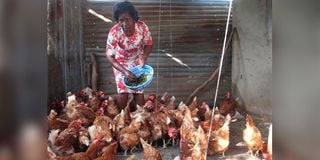Meet Bill Gates’ Makueni host

Mary Mathuli with some of her chickens in Ngunu village, Makueni County, on December 4, 2023.
What you need to know:
- The mixed farmer has at least 3,000 chickens at any one point, keeps fish and two dairy cows and also grows beans and maize.
- The last six months have seen the bulk of Mathuli’s enterprise shift towards training on good agricultural practices following her experience.
Until March when American philanthropist Bill Gates toured her farm, Mary Mathuli was not known beyond Muvau village in Makueni County.
Mathuli is part of a network of village-based advisers using their farms to train locals on enhancing production.
“When I am not hosting teams of farmers, I am training them on their lands,” the mother of two says on the sidelines of a training on the three acres.
The mixed farmer has at least 3,000 chickens at any one point, keeps fish and two dairy cows whose feed she formulates at home. She also grows beans and maize.
The last six months have seen the bulk of Mathuli’s enterprise shift towards training on good agricultural practices following her experience.
To sustain the birds, Mathuli formulates the feed using maize meal, maize jam, wheat bran, sunflower, cotton seed, fish meal and bone meal.
Mathuli grows Azolla, an aquatic fern rich in protein, which she uses as a supplementary feed for the chickens and fish.
She advises new farmers to formulate chicken feed using locally available materials like sorghum, sunflower, cowpeas and maize seeds. These are also affordable.
Mathuli sells the surplus feed to farmers in her networks. She also sells certified seeds, fertiliser and other inputs from a stall at home.
A 2014 workshop by Micro Enterprises Support Programme Trust, an NGO promoting climate-smart agriculture, opened Mathuli’s eyes.
She started with 10 indigenous chickens, expanding the number to 800 in two years.
As the chicken enterprise grew, Mathuli took a Sh20,000 loan. The success of the business earned her a chance for a second training sponsored by the devolved government at Voi Institute of Technology in 2019.
The training targeted chicken, green gram and mango smallholder farmers.
Mathuli’s fortune and confidence as a village-based adviser grew in leaps and bounds when she hosted Microsoft founder Bill Gates.
“Makueni is the leading producer of mangoes and citrus fruits in Kenya. Unfortunately, many of these farmers do not reap as much as they should from their enterprises. They harvest once a year yet they can do so throughout the period of the mature trees,” she says.

Mary Mathuli displays a basin containing Azolla, a protein rich aquatic fern, used as chicken feed, at Ngunu Village in Makueni County on December 4, 2023.
“They can do this by keeping chickens and setting up kitchen gardens. The most common mistakes chicken farmers make is going for indigenous breeds, which take long to mature. Many also keep just handful, something that does not make economic sense. They do not vaccinate them against common infections like New Castle, guboro and fowl pox.”
One being trained on her farm pays Sh1, 000. The fee is more if the training is elsewhere.
Mathuli has signed deals with several organisations whose programmes are geared towards improving food security.
Judy Musyoki, a business development officer at Cereal Growers Association (CGA) – one of the organisations working with Mathuli – says village-based advisers should convert the farmers they serve to an enviable market for their produce.
“CGA expects every adviser to reach out to at least 200 farmers. Since they are volunteers, we encourage the village-based advisers to tap into existing entrepreneurship opportunities in the value chains,” Musyoki says.
“They make a small fee by offering basic services like vaccinating chickens and linking farmers with suppliers of inputs. They also are the providers of essential services like tractor operators and maize and sorghum shelling machines.”
She says village-based advisers are at the centre of an aggressive drive to enhance food security in Kitui, a semi-arid county.
The campaign, which is being undertaken by the county government and multiple organisations, entails promoting the uptake of inputs like certified seeds and fertiliser as well as deep tillage services among smallholder farmers.
According to Nicholas Syano, a lecturer at Machakos University, the growing popularity of village-based advisers is hinged on the importance of agribusiness training.
“County governments at times have a shortage of extension officers. That is when the advisers come in,” he says.
Even where there are adequate extension officers, many farmers prefer village-based advisers “because seeing is believing”.
The model farm enables locals to experience lessons offered by the agronomist practically, building trust between the farmer and the agronomist.
The demonstration farm like Mathuli’s sustains the extension service in that the village-based adviser converts the visiting farmers to a big market for his or her produce.
“This is not the case with conventional extension officers who rely exclusively on support from county governments,” says the dry lands resources management expert who operates a demonstration farm dubbed in Maiyuni village, Makueni County.





